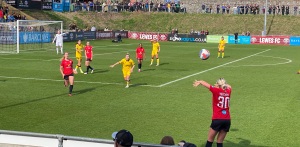Yesterday (21st April 2024), a record league crowd of 2,614, packed the Dripping Pan for the final home game of the 2023/24 season to watch Lewes Women against Crystal Palace. The Rooks needed a draw or a win to have any hope of avoiding relegation, and Palace a win to all but secure the championship and promotion to the Women’s Super League.
 But it was not to be with Lewes losing 2-0. Congratulations to Crystal Palace and best wishes for next year in the best women’s league in the world. But for Lewes, next season will see us in the Southern Premier League, with trips to Plymouth, Cardiff and Oxford.
But it was not to be with Lewes losing 2-0. Congratulations to Crystal Palace and best wishes for next year in the best women’s league in the world. But for Lewes, next season will see us in the Southern Premier League, with trips to Plymouth, Cardiff and Oxford.
I can’t express the level of my disappointment and sadness, for the players and staff, and all the loyal supporters who stuck with the Rooks through a difficult season. It could have been so different. In at least least three games we conceded equalisers in the 90th minute or later, thus squandering six points. Worst came at league leaders Sunderland where we squandered a 3-2 lead to lose 4-3 with goals in the 94th and 95th minutes.
Lewes signed a number of exciting players over the last year or so, not least our keeper, Sophie Whitehouse. But it says something that she was regularly named as our player of the match. There was also Maltese international, Maria Farrugia, who was named Barclays Player of the Championship for March, not a bad achievement for someone playing in a team struggling in the relegation zone. I always enjoyed the combative approach taken by Hollie Olding and Lois Heuchan. I wonder how many of these players, and the squad as a whole, we will be able to retain for next season.
But there was something missing. The team didn’t always gel as a unit and seemed to lack some imagination in its football in a league where the standard of play improved faster than that of our team.
Lewes FC has brought something special to the Women’s Championship and to women’s football as a whole. Equality FC – the clubs commitment to equality between our women and men’s teams (equal pay, equal access to facilities, marketing, etc.) – continues to be a beacon of enlightenment in women’s sport and a challenge to the football hierarchy. It inspired me to become a co-owner and an enthusiast for everything the club stands for.
What will remain as we contemplate football in the third tier of the English game, is the spirit of the club personified by the enthusiastic support that the team gets week-in, week-out. For most of us, we have stuck with the team through thick and thin, and we will be there when the new season commences. And as an eternal optimist, back-to-back promotions to the Championship and then the Women’s Super League over the next two years is an exciting prospect …! COYR!




